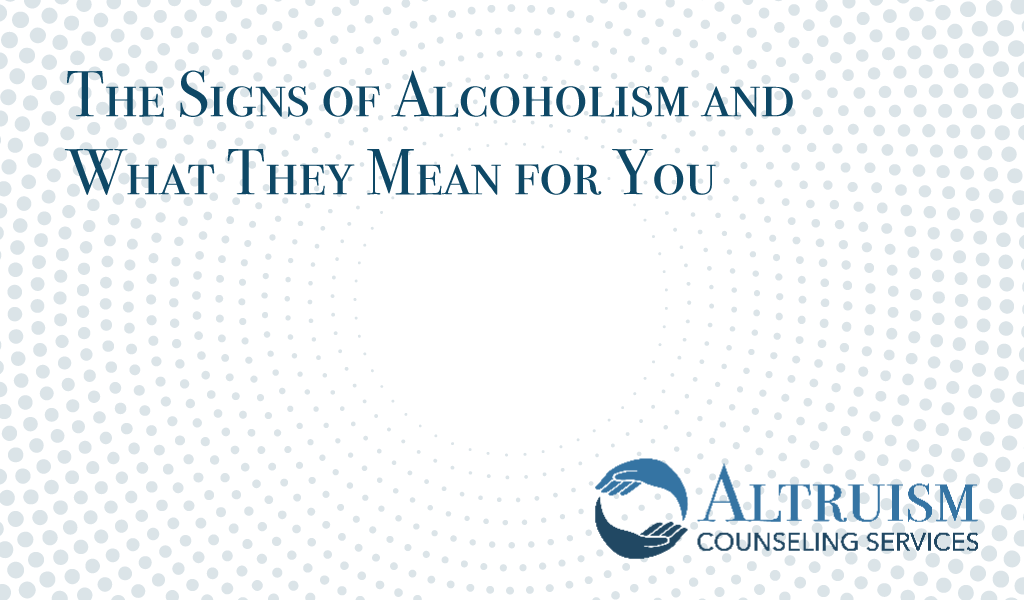
What is the difference between frequent alcohol use and an alcohol use disorder?
It’s not always easy to answer that question. After all, your opinion of that might differ from your sister’s, or your father’s. Your wife might insist you have a problem because you go out for drinks almost every night, but for you, that’s just having a well-deserved break with your friends after a long work day.
Where should you draw the line? Can you recognize the signs of alcoholism in others – or yourself? Fayette County, where Altruism Counseling is located, was one of the counties in Kentucky with the highest presence of AUD in 2019. We know what a concern this is in our community, and how important those questions are. Let us give you some answers.
Alcohol use disorder is a medical condition, and just like other conditions, has a list of criteria for diagnoses. This criteria comes from the Diagnostic and Statistical Manual of Mental Disorders, Fifth Edition (DSM-5). Experiencing multiple of the following in twelve months might indicate an alcohol use disorder:
According to the DSM-5, meeting two of these criteria indicates a mild alcohol use disorder, meeting four suggests a moderate AUD, and six or more criteria indicates a severe AUD. It’s important to note that this article is no substitute for a medical professional, and you can only receive a diagnosis by seeing one. If you meet these criteria, it’s a good idea to seek help for a potential alcohol use disorder.

Alcohol use disorder starts with frequent intoxication. You’re probably familiar with those symptoms, but let’s review just in case:
If you or a loved one are commonly “drunk,” that’s an early cause for concern. It’s best not to drink alcohol at all, but one drink or less per day for women and two or less for men is considered “moderate alcohol use,” and isn’t necessarily something you need to worry about.
Behavioral changes, such as lying about drinking habits, drinking heavily alone, binge drinking (four+ drinks in two hours for women, and five+ for men), drinking to cope with stress, and withdrawing from loved ones can be another indication of an alcohol use disorder.
Chronic alcohol use comes with serious consequences on mental and physical health. If you drink frequently and notice negative changes to your health, it might not be a coincidence.
Alcohol is a depressant, meaning it slows down brain function. Your brain naturally tries to balance things out, so it adapts if you drink consistently for a long time. It releases more excitatory neurotransmitters to speed up brain function again. When the alcohol is out of your system, those excitatory neurotransmitters linger in your brain, causing alcohol withdrawal that impacts you both physically and mentally.
Anxiety is a common feeling from alcohol withdrawal, but alcohol use can exacerbate or cause anxiety disorders even outside of the withdrawal period. The same is true for depression. Mood changes are common, too. Sometimes, prolonged, heavy alcohol use can even cause brain shrinkage, or damage to the frontal lobe, which is key in the decision-making process.
Wernicke-Korsakoff Syndrome (WKS), also known as wet brain, is also a possibility, due to nutritional deficiencies frequent alcohol use can cause. This condition causes severe confusion, learning, and memory difficulties.
Even if you don’t develop WKS, long-term alcohol use can cause memory issues and cognitive decline.
The liver is the organ that processes and detoxes alcohol, so it takes the brunt of the damage. Your liver function declines due to constant exposure to toxins. That, paired with the liver overworking, can kill liver cells, causing hepatitis. Liver tissue can die, leaving scar tissue in the place of functioning liver tissue, leading to cirrhosis and permanent liver damage. Steatotic liver, a condition where fat builds up in liver cells, can affect people after just a short period of heavy drinking. While fatty liver is reversible, cirrhosis isn’t.
Alcohol can cause inflammation in other parts of the body, including the pancreas, which can lead to pancreatitis. This can impact blood sugar levels, presenting additional dangers to people with diabetes and hypoglycemia.
Because alcohol slows the central nervous system, it can do damage in that area too, potentially leading to numbness or tingling in your hands or feet.
Alcohol also irritates your digestive system, which can interfere with nutrient and vitamin absorption. Sometimes, long-term drinking can cause ulcers. Gas and bloating due to alcohol aren’t uncommon.
Your heart also takes a hit from alcohol. The substance raises blood pressure and cholesterol, and makes blood clots more likely. It can also lead to heartbeat abnormalities, heart attack, and heart disease, due in part to alcohol interfering with the ability to pump blood properly.
Drinking also lowers libido over time, can cause fertility problems, and interfere with menstrual cycles. Muscles and bones also get weaker with prolonged alcohol use.
Immune system function also declines thanks to alcohol, increasing your risk of developing tuberculosis and pneumonia. It even increases your chance of getting certain cancers, including head, neck, esophagus, liver, and breast cancer. This is especially true for individuals who smoke because alcohol makes it easier for harmful chemicals from tobacco to impact your body.
If you have an alcohol use disorder, you’ll likely experience physical withdrawal symptoms, too, which can include nausea, tremors, seizures, sweating, and irregular heartbeat.
In 2022, 11% of the United States adult population had an alcohol use disorder. That’s over 28 million people. 3% of American adolescents had an alcohol use disorder, too, proving AUD is an issue for all ages, genders, and races. Interestingly, while men are usually more affected by AUD, in the teen population, girls were more impacted by it.
Let’s take a close look at Kentucky, too. In 2019, 40% of people in treatment for substance use disorders in Kentucky were there for an alcohol use disorder, so if you’re considering seeking help, you definitely wouldn’t be alone.
14% of Kentucky adults reported binge drinking in 2022, making it lower than the national average of 17%. While binge drinking doesn’t always indicate an alcohol use disorder, it does take a toll on the health of anyone participating in it, and it can be a risk factor. In Kentucky, binge drinking is most common among men, people with college degrees, and people making over $50,000 a year. That’s a pattern seen frequently across the country, too.
A sign of alcohol use disorder is drinking in hazardous situations, such as driving. People with alcohol use disorder are more likely to drive while intoxicated than those without it. 32% of driving fatalities in 2022 were due to alcohol use. This is just another reason to help people with alcohol use disorder, and one that isn’t spoken about frequently.

Hopefully now, you have your answers. You know what an alcohol use disorder looks like, and its consequences. If you relate to these signs, what do you do now? It’s time to consider seeking help. While some people can quit drinking on their own, it’s a difficult process. It’s easier with other people to walk alongside you and support you. Treatment for alcoholism (alcohol use disorder) is available, and it will change your life.
Altruism Counseling, located in Lexington, Kentucky, was founded on the principles of altruism – meaning we’re here to help without ulterior motives. We accept Medicaid, Medicare, commercial insurance, and private pay, because we want everyone to have access to quality counseling and education for alcohol use disorders. Give us a call at 859-310-6505, and find yourself again.